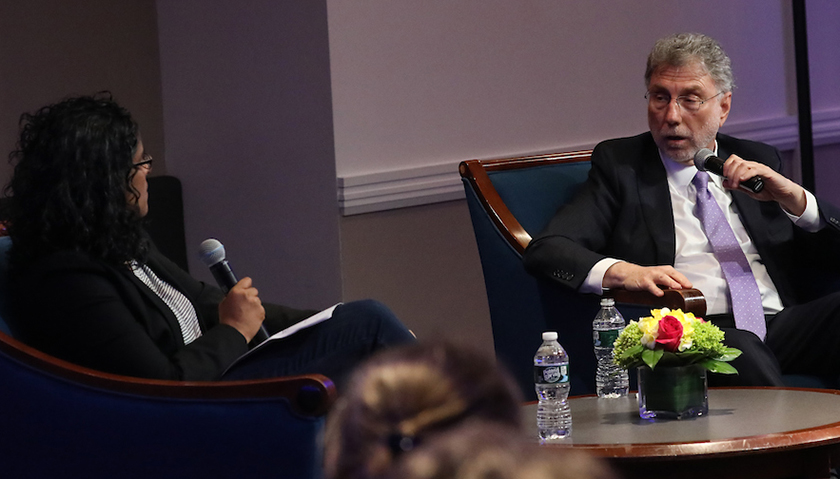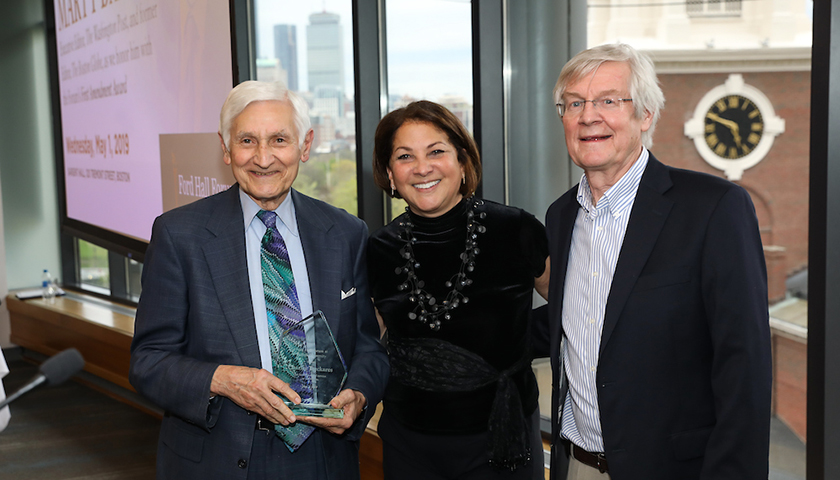News as a Guardian of Democracy
Ford Hall Forum honors Washington Post Editor Marty Baron with First Amendment Award

Accurate, unbiased news is under fire from many fronts, yet Washington Post Editor Marty Baron presented ideas for preserving this pillar of democracy during a discussion at the Ford Hall Forum at Suffolk University (video), which presented him with its First Amendment Award last night.
In receiving the award, Baron said that newsrooms across the country are committed to telling the public the truth, “and the way we get to that truth is through the rights given to us through the First Amendment.”
Baron expanded on the challenges and opportunities for the news media given the disruption of the Internet, discussed how to hold the public’s trust when news is under attack from people in power, and described some of the blockbuster stories he’s managed in a discussion moderated by Meghna Chakrabarti of NPR’s On Point.
“The ultimate guardian of our democracy is not the press, it’s the public,” said Baron, and if people don’t think it’s important to preserve the integrity of the courts, elections, and law enforcement, “a democracy can die.” But it is the news media that play an important role in raising people’s awareness of these public entities.
The Washington Post's slogan, Democracy dies in darkness, calls to mind the threats to a news industry in financial jeopardy since its revenue-producing advertising was scooped up by the Internet. And allegations of “fake news” have led to a loss of the people’s trust.
“A lot of people aren't taking us for granted anymore,” said Baron.
The Post went from losing money to making money under the ownership of Amazon founder Jeff Bezos, who stays away from the news side while tapping his business acumen to create a successful model of paid online access for a global audience at no additional cost in resources.
However, the Post had the benefit of being the paper of record in the nation’s capital and a legendary reputation stemming from stories such as the Watergate investigation.
Baron posed the question: “What is the model for local journalism?” and said that local media have to find a way to make themselves indispensable to their audiences through investment in investigative journalism and stories that matter to ordinary people.
Noting the divisions within our nation today, he said that many people believe the news media “are essential to our democracy,” while others feel it has taken too many liberties with the truth.
To regain the people’s trust, Baron said the news media should let them know more about the people reporting the news and how they do their work. He described a Washington Post newsroom that, contrary to skeptics’ views, reflects America’s demographics, with a staff from small towns and cities across the country, which include military veterans, people with strong religious beliefs, and conservative, moderate, and liberal political views. And he noted that posting links to actual documents, such as the Mueller letter to Attorney General Barr, offers proof that sources are legitimate.
His own relationship with news began in his childhood home in Florida, where every day he read the newspapers his immigrant family subscribed to and where consuming local and national television news shows were an important part of the daily routine. He later became editor of his college newspaper and, when an interviewer for a business-related job asked him what he really wanted to do, realized that journalism was his calling.
Baron also took time to speak with student journalists. And Haley Clegg, who is following a path similar to his as editor of the Suffolk Journal, said she relished the opportunity to interview a legendary newsman for the student newspaper.
Baron shared some noteworthy stories from his career
• At the Miami Herald, Baron spearheaded a recount of Florida’s Bush-Gore presidential ballots after the Supreme Court denied the Democrats’ attempts to do so. The newspaper and an accounting company were able to complete the task statewide, except for Palm Beach County, where the butterfly ballot design is alleged to have caused Democrats to mistakenly cast more than one vote for president and thus have their ballots discarded “and you couldn't really count them.” With that county excluded, the Miami Herald’s recount showed Bush winning the state that sealed the election.
• When Elian Gonzalez’s mother died at sea escaping Cuba, a court battle ensued between forces who wanted him to remain in Florida with relatives and those who wanted him to return to his father in Cuba. “People saw bias in every single story,” said Baron, with complaints coming in from both sides daily. “In Cuban American homes the boy became a symbol. Their lived experiences informed their views of what should have happened to Gonzalez…and it’s important to understand these stories at that deeper level.”
• Before joining the Boston Globe, Baron was learning and reading about the city. He was surprised that a Globe column about an abusive Catholic priest concluded with the statement that the truth about the extent of the abuse might never be known because the records were sealed. “So I asked about it at my first news meeting,” he said. The question led to the Spotlight team’s uncovering priests’ sexual predation, its impact on victims, and the archdiocesan cover-up. The investigation, later depicted in an Academy-Award-winning film, is still having global repercussions today.
In addition to awarding the First Amendment Award to Baron, the Ford Hall Forum at Suffolk University recognized longtime Forum Advisory Council member Charles Tsectares. He had begun his association with the forum in 1951 as a New Hampshire high school debater whose civics teacher would drive debate team members to Boston to learn from the discussions. He later joined the advisory council, serving for 43 years.
In receiving the award, Baron said that newsrooms across the country are committed to telling the public the truth, “and the way we get to that truth is through the rights given to us through the First Amendment.”
Baron expanded on the challenges and opportunities for the news media given the disruption of the Internet, discussed how to hold the public’s trust when news is under attack from people in power, and described some of the blockbuster stories he’s managed in a discussion moderated by Meghna Chakrabarti of NPR’s On Point.
“The ultimate guardian of our democracy is not the press, it’s the public,” said Baron, and if people don’t think it’s important to preserve the integrity of the courts, elections, and law enforcement, “a democracy can die.” But it is the news media that play an important role in raising people’s awareness of these public entities.
The Washington Post's slogan, Democracy dies in darkness, calls to mind the threats to a news industry in financial jeopardy since its revenue-producing advertising was scooped up by the Internet. And allegations of “fake news” have led to a loss of the people’s trust.
“A lot of people aren't taking us for granted anymore,” said Baron.
Successful Bezos business model
The Post went from losing money to making money under the ownership of Amazon founder Jeff Bezos, who stays away from the news side while tapping his business acumen to create a successful model of paid online access for a global audience at no additional cost in resources.
However, the Post had the benefit of being the paper of record in the nation’s capital and a legendary reputation stemming from stories such as the Watergate investigation.
Baron posed the question: “What is the model for local journalism?” and said that local media have to find a way to make themselves indispensable to their audiences through investment in investigative journalism and stories that matter to ordinary people.
Building trust
Noting the divisions within our nation today, he said that many people believe the news media “are essential to our democracy,” while others feel it has taken too many liberties with the truth.
To regain the people’s trust, Baron said the news media should let them know more about the people reporting the news and how they do their work. He described a Washington Post newsroom that, contrary to skeptics’ views, reflects America’s demographics, with a staff from small towns and cities across the country, which include military veterans, people with strong religious beliefs, and conservative, moderate, and liberal political views. And he noted that posting links to actual documents, such as the Mueller letter to Attorney General Barr, offers proof that sources are legitimate.
His own relationship with news began in his childhood home in Florida, where every day he read the newspapers his immigrant family subscribed to and where consuming local and national television news shows were an important part of the daily routine. He later became editor of his college newspaper and, when an interviewer for a business-related job asked him what he really wanted to do, realized that journalism was his calling.
Baron also took time to speak with student journalists. And Haley Clegg, who is following a path similar to his as editor of the Suffolk Journal, said she relished the opportunity to interview a legendary newsman for the student newspaper.
Baron shared some noteworthy stories from his career
• At the Miami Herald, Baron spearheaded a recount of Florida’s Bush-Gore presidential ballots after the Supreme Court denied the Democrats’ attempts to do so. The newspaper and an accounting company were able to complete the task statewide, except for Palm Beach County, where the butterfly ballot design is alleged to have caused Democrats to mistakenly cast more than one vote for president and thus have their ballots discarded “and you couldn't really count them.” With that county excluded, the Miami Herald’s recount showed Bush winning the state that sealed the election.
• When Elian Gonzalez’s mother died at sea escaping Cuba, a court battle ensued between forces who wanted him to remain in Florida with relatives and those who wanted him to return to his father in Cuba. “People saw bias in every single story,” said Baron, with complaints coming in from both sides daily. “In Cuban American homes the boy became a symbol. Their lived experiences informed their views of what should have happened to Gonzalez…and it’s important to understand these stories at that deeper level.”
• Before joining the Boston Globe, Baron was learning and reading about the city. He was surprised that a Globe column about an abusive Catholic priest concluded with the statement that the truth about the extent of the abuse might never be known because the records were sealed. “So I asked about it at my first news meeting,” he said. The question led to the Spotlight team’s uncovering priests’ sexual predation, its impact on victims, and the archdiocesan cover-up. The investigation, later depicted in an Academy-Award-winning film, is still having global repercussions today.
Six-decade Forum aficionado
In addition to awarding the First Amendment Award to Baron, the Ford Hall Forum at Suffolk University recognized longtime Forum Advisory Council member Charles Tsectares. He had begun his association with the forum in 1951 as a New Hampshire high school debater whose civics teacher would drive debate team members to Boston to learn from the discussions. He later joined the advisory council, serving for 43 years.

Contact
Greg Gatlin
Office of Public Affairs
617-573-8428



